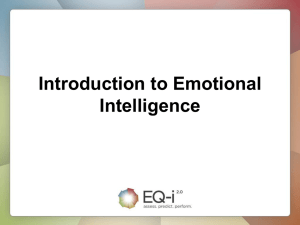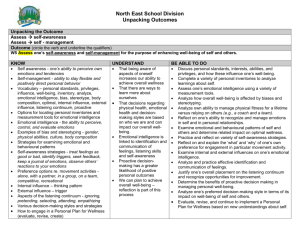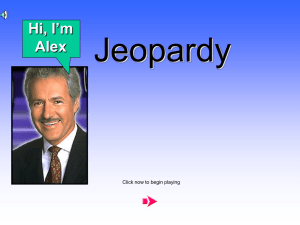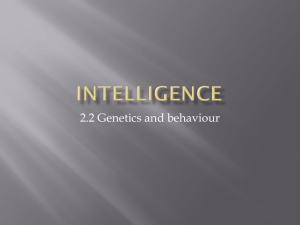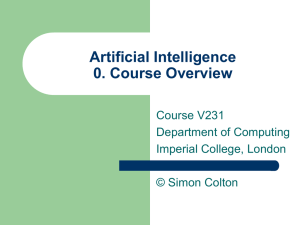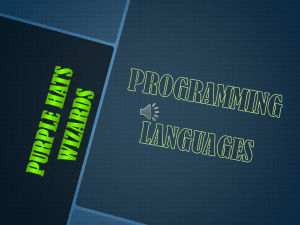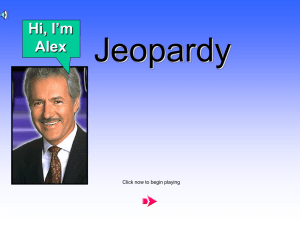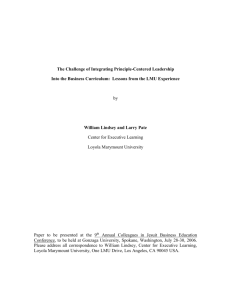EQ Emotional Intelligence Quotient In Action - Academic Affairs
advertisement
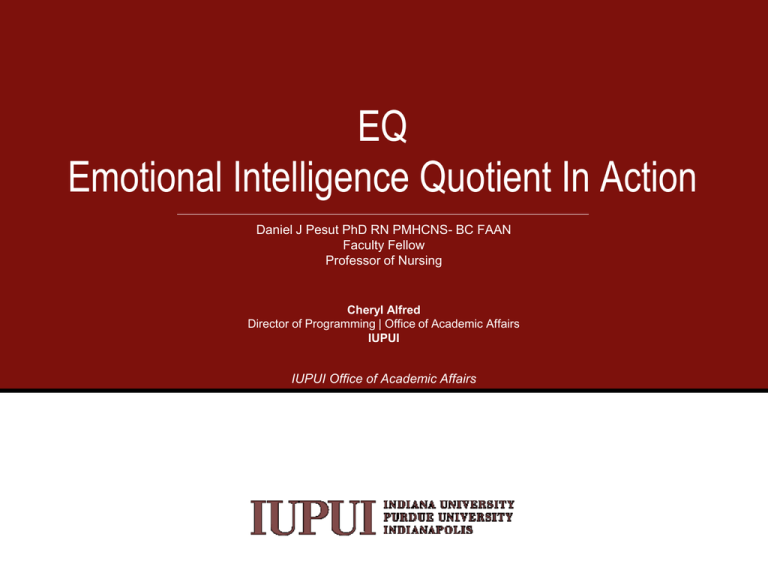
EQ Emotional Intelligence Quotient In Action Daniel J Pesut PhD RN PMHCNS- BC FAAN Faculty Fellow Professor of Nursing dpesut@iupui.edu Cheryl Alfred Director of Programming | Office of Academic Affairs IUPUI calfred@iupui.edu IUPUI Office of Academic Affairs Knowledge Work Questions • What concepts, tools, techniques, or resources are most useful? • How can the information be used? • Why is the information important? • Why care about the information? Outcomes • Define and discuss the role of Emotional Intelligence in management and leadership contexts. • Reflect and share learning and insights gained from the Emotional Intelligence 2.0 Assessment. • Explain the four skills that support using EQ in action: self awareness, self management, social awareness and relationship management. • Develop an EQ Action Plan to heighten and expand one’s personal emotional intelligence quotient. The Stake Prime Permalink: http://theprimes.com/stake A Definition of Emotional Intelligence “Emotional Intelligence refers to the capacity for recognizing our own feelings and those of others, for motivating ourselves, and for managing emotions well in ourselves and our relationships.” - Daniel Goleman The Path Between Feeling and Reason Emotional Intelligence • “The ability to sense, understand and effectively apply the power and acumen of emotions as a source of human energy, information, connection and influence” Cooper, Robert & Sawaf, Ayman. (1997). Executive EQ: Emotional intelligence in leadership & organizations: Grosset/Putnam: New York. Cornerstones • Literacy – Honesty, energy, feedback, practical intuition • Fitness – Authentic presence, trust, constructive discontent, resilience and renewal Cooper, Robert & Sawaf, Ayman. (1997). Executive EQ: Emotional intelligence in leadership & organizations: Grosset/Putnam: New York. Cornerstones • Depth – Unique potential and purpose, commitment, accountability and conscience, applied integrity, influence without authority • Alchemy – Intuitive flow, reflective time shifting, opportunity sensing, creating the future Cooper, Robert & Sawaf, Ayman. (1997). Executive EQ: Emotional intelligence in leadership & organizations: Grosset/Putnam: New York. People with High EQ Know: • • • • Who they are What they need to do to take care of themselves Who others are within their own context How they need to manage their impact on others. EQ is not… • • • • • Letting your feelings run rampant Being nice regardless of what happens to you Specific to gender or genetically fixed IQ, knowledge or education based About anger management EQ in Action What positive and/or negative examples do you see of emotional intelligence? http://www.youtube.com/watch?v=rNseShYxCVc There’s No Crying in Baseball How do you think the coach would score on his EQ Assessment? http://www.youtube.com/watch?v=gKCHvOvlHL0 EQ Application to Leadership Manager Model Managing Yourself • Empathy • Self Control • Self Confidence Managing Your Team • Developing Others • Holding People Accountable • Team Leadership Managing the Work • Results Orientation • Initiative • Problem Solving Managing Collaboratively • Influencing Others • Fostering Teamwork EQ Clusters developed by Daniel Goleman Actions Awareness Self SelfAwareness Others Social Awareness SelfRelationship Management Management The Impact of Self-Awareness Research supports that Self-Awareness is a necessary underpinning of both Self-Management and Social Awareness Self Awareness & Self Management With Self-Awareness, a person has 50/50 chance of demonstrating SelfManagement Self-Management SelfAwareness Yes No Yes 49% 51% No 4% 96% N = 427, p < .001 (Burckle and Boyatzis, 1999) Without Self-Awareness, a person has virtually no chance of demonstrating SelfManagement. Self Awareness & Social Awareness With Self-Awareness, a person has a 38% chance of having Social Awareness Social Awareness Yes No SelfAwareness Yes No 38% 17% 62% 83% N = 427, p < .001 (Burckle and Boyatzis, 1999) Developing EQ Involves • • • • Revising responses to feelings Changing thinking patterns Altering behavior and trying new things Coaching can be instrumental in the process Emotions Thoughts Behavior Performance SelfAwareness • Emotional Self-Awareness • Accurate Self-Assessment • Self-Confidence SelfManagement • • • • • Emotional Self-Control Transparency Optimism Adaptability Achievement Orientation • Initiative Social Awareness • Empathy • Organizational Awareness • Service Orientation Relationship Management • Developing Others • Inspirational Leadership • Influence • Change Catalyst • Conflict Management • Teamwork & Collaboration The Twenty EQ Competencies Appreciative Interviews Success and Challenges Spend 7-8 Minutes reviewing the EQ Competencies. Then find a partner and take turns spending 12 minutes each sharing which of the 20 EQ competencies come easy to you and which are still a challenge. SelfAwareness • Emotional Self-Awareness • Accurate Self-Assessment • Self-Confidence SelfManagement • • • • • Emotional Self-Control Transparency Optimism Adaptability Achievement Orientation • Initiative Social Awareness • Empathy • Organizational Awareness • Service Orientation Relationship Management • Developing Others • Inspirational Leadership • Influence • Change Catalyst • Conflict Management • Teamwork & Collaboration The Twenty EQ Competencies The Path Between Feeling and Reason David Rock : The SCARF Model http://www.youtube.com/watch?v=isiSOeMVJQk Train Your Brain The Final Game Which EQ Skill(s) has the Coach Improved? Knowledge Work Questions • What concepts, tools, techniques, or resources are most useful? • How can the information be used? • Why is the information important? • Why care about the information?
